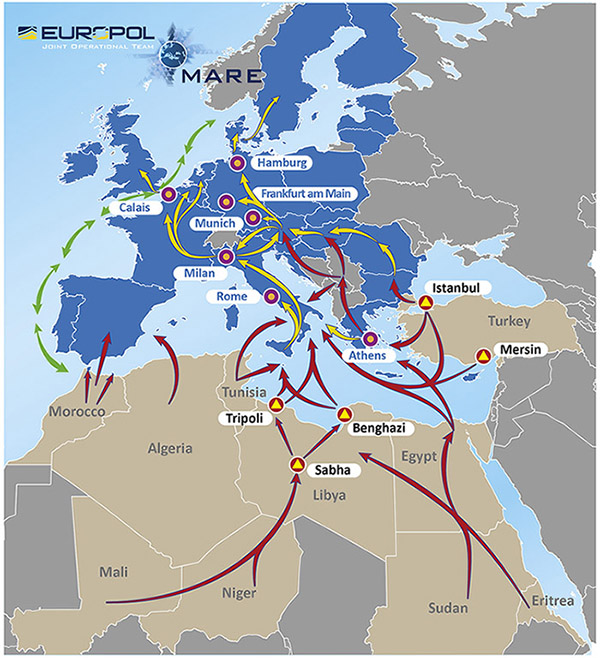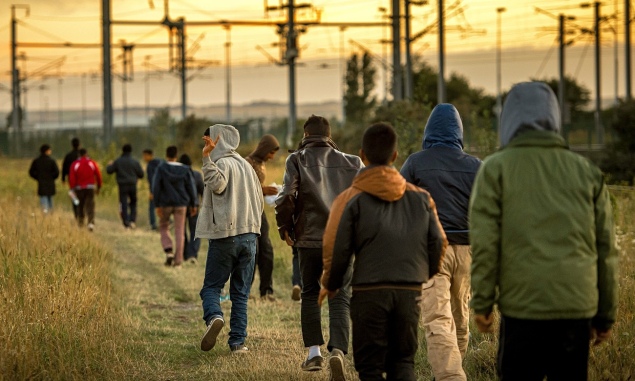
It is difficult to look at Europe and its Member States and feel proud of their accomplishments and actions in the last six months. From the continuous migration crisis getting his coverage since April, to the ultra-nationalist national political campaigns (in Britain, Denmark, Poland), to the Greek fiasco, and now to the Franco-British clash over migrants held in a camp in Calais, European affairs have taken a turn for the worst. All these issues/crises share one factor in common: the inability by Europeans to control their present and shape their futures.
Migration – All the Roads Do not Lead to London
The question of migration is more than a European problem, it is a global tragedy. Reports, from newspapers, think tanks, NGOs, and other international agencies, all identify the current migrants as political, economic and environmental refugees.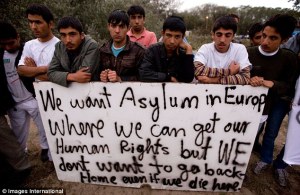 These migrants are in fact for most of them coming from countries destroyed by war (Syria, Libya, Sudan, Afghanistan), by terrorism and political repression (Eritrea, Yemen, Somalia) and so forth. These migrants are traveling thousand of miles through the toughest conditions imaginable all in direction of one of the richest and most stable region in the world, Europe. As previously reported (read here and here), the routes to Europe are by the Central Mediterranean region in direction of Italy, or by the short distance between Turkey and Greece (more Eastern route). Once in Italy, the migrants just go North in direction of France, Germany and some Scandinavian countries. In Greece, migrants go North through Macedonia and then West in direction of France and Germany (see the map below).
These migrants are in fact for most of them coming from countries destroyed by war (Syria, Libya, Sudan, Afghanistan), by terrorism and political repression (Eritrea, Yemen, Somalia) and so forth. These migrants are traveling thousand of miles through the toughest conditions imaginable all in direction of one of the richest and most stable region in the world, Europe. As previously reported (read here and here), the routes to Europe are by the Central Mediterranean region in direction of Italy, or by the short distance between Turkey and Greece (more Eastern route). Once in Italy, the migrants just go North in direction of France, Germany and some Scandinavian countries. In Greece, migrants go North through Macedonia and then West in direction of France and Germany (see the map below).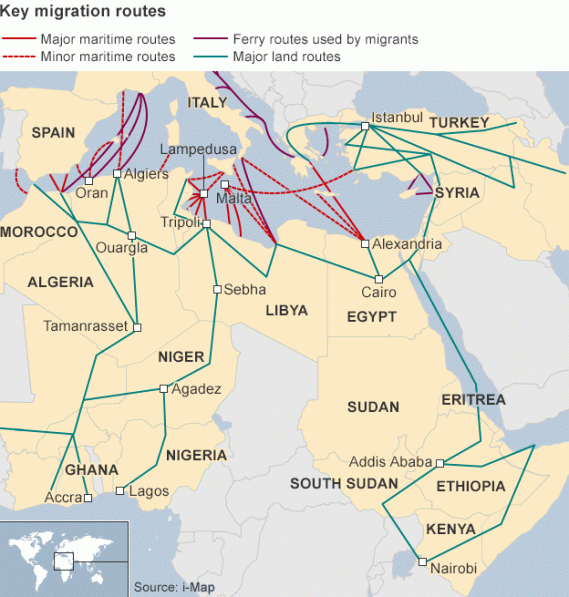
Once on the European continent, these are the different routes and final destinations of most migrants as illustrated by a map produced by Europol:
This massive migration wave is highlighting two problems: a human tragedy for all these migrants (the episode of Lampedusa and so forth illustrate the dangers of such journey); and a political tragedy of European inabilities to deal with this crisis seriously. Instead of developing a serious set of policies in order to adjust their national laws, the tensions have increased among neighboring Member States. For example, France and Italy had a rift over several hundred migrants being stuck in the border-town of Vintimille, and between France and the United Kingdom over what 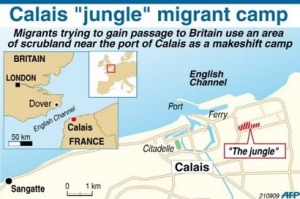 is described by London of an invasion of migrants located at the infamous so-called ‘Jungle’ camp near Calais. This camp is counting between 3,000 and 5,000 individuals (as a comparison, Turkey and Lebanon are dealing with camps from 1 to 2 millions refugees, so it is difficult to believe that one of the richest country in the world, France, cannot manage a camp of roughly 5,000 refugees). American and European media have covered in recent days a little more the camp, even though this precarious camp has existed for years and was preceded by the camp of Sangatte. Interestingly enough, all migrants in the Calais’ camp are not all trying to get to Britain. Some of them are trying to remain in France.
is described by London of an invasion of migrants located at the infamous so-called ‘Jungle’ camp near Calais. This camp is counting between 3,000 and 5,000 individuals (as a comparison, Turkey and Lebanon are dealing with camps from 1 to 2 millions refugees, so it is difficult to believe that one of the richest country in the world, France, cannot manage a camp of roughly 5,000 refugees). American and European media have covered in recent days a little more the camp, even though this precarious camp has existed for years and was preceded by the camp of Sangatte. Interestingly enough, all migrants in the Calais’ camp are not all trying to get to Britain. Some of them are trying to remain in France.
National Rhetorics and the Fear of the Other
The problem of migration – legal and illegal – is a central one for anyone wanting to understand the current political debates at the national and European levels. Even legal migration between the 28 EU Member States is a cause of domestic tension even though such sort of migration is directly connected to the freedom of movement, one of the four freedoms guaranteed by the common market. So in the case of illegal migration, it is not difficult to imagine the tone of the debate.
Domestically, the radical parties (especially the extreme right) have risen above their former status of opposition parties, to becoming a shaping-force of the national debate. In the case of France, the Front National (currently facing internal family-feud) is now considered as one of the top french parties, with the Socialist Party and the newly-renamed right wing party, Les Républicains. The Front National (FN) has made its name by blaming all France’s troubles and decline on Europe, globalization and the immigrants. In the United Kingdom, the United Kingdom Independence Party (UKIP), led by Nigel Farrage, was as well an important actor framing Britain’s crises because of Europe and immigrants. His sudden rise, despite some disappointing results in the May elections, has forced Cameron’s government to talk tougher. Ensuing the June elections in Denmark, the anti-EU and anti-immigrant party, Danish People’s Party (DPP), has risen to the second rank of national parties. And these radical parties have only been identified because of the recent elections in each country. But other EU Member States, like the Netherlands, Hungary, Poland, Austria, Italy, Greece, and so forth, are as well dealing with a powerful extreme right political force changing the tone of the debate.
Now, two questions remain to be answered: First, to what extent are these extremist parties throughout Europe influencing the debate on migration? Second, are mainstream right wing parties eventually showing their true colors? For instance, the recent rhetoric emanating from London are quite worrisome. Prime Minister Cameron has had some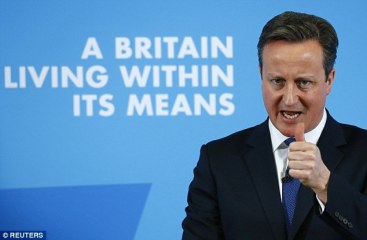 tough words about these migrants ‘invading’ Britain. In July, PM Cameron compared the migrants stuck in Calais as a “swarm of people coming across the Mediterranean” and has been advocating for stricter immigration rules in Britain. Weeks later, British foreign secretary, Philip Hammond, made comments aligned with his leadership about the current migration crisis and claimed that Europe “can’t protect itself.” He continued saying that “The gap in standards of living between Europe and Africa means there will always be millions of Africans with the economic motivation to try to get to Europe.” In France, under President Sarkozy, the tone towards immigrants was very negative and aggressive. Sarkozy and his Minister of Interior, Brice Hortefeux, stole some of the narratives from the Front National either for political gain or by sympathy for such belief. For instance, in June 2010, Brice Hortefeux was fined for making racist comments towards a man of North Africa origins.
tough words about these migrants ‘invading’ Britain. In July, PM Cameron compared the migrants stuck in Calais as a “swarm of people coming across the Mediterranean” and has been advocating for stricter immigration rules in Britain. Weeks later, British foreign secretary, Philip Hammond, made comments aligned with his leadership about the current migration crisis and claimed that Europe “can’t protect itself.” He continued saying that “The gap in standards of living between Europe and Africa means there will always be millions of Africans with the economic motivation to try to get to Europe.” In France, under President Sarkozy, the tone towards immigrants was very negative and aggressive. Sarkozy and his Minister of Interior, Brice Hortefeux, stole some of the narratives from the Front National either for political gain or by sympathy for such belief. For instance, in June 2010, Brice Hortefeux was fined for making racist comments towards a man of North Africa origins.
It is time that center-right parties finally opposed once and for all the xenophobic and anti-EU narratives advanced by extreme-right parties. If their electorates increase it is not because Europeans are becoming more racist or anti-EU, but that they are tired of a visionless, leaderless, and scared political class. All these radical national parties in Europe share this commonality of stating clearly what they think, even though it is not true (like linking terrorism to immigration; or opposing globalization and returning to a protectionist economy). In addition, the current socio-economic climate in Europe is propice to such rise as the center-right and left parties have been unable to real make the required changes in order to launch the economic engine.
Creative Thinking for a Complex Challenge
The fear of the immigrants has always existed and Europe is not the only continent to face such problem. The current political debate in the United States about securing the southern border with Mexico and the legalization of long-term immigrants will play an important role in the 2016 Presidential election. In the case of Europe, the flow of migrants continues to grow every year and require some serious discussion, reflection and policy change at the European level.
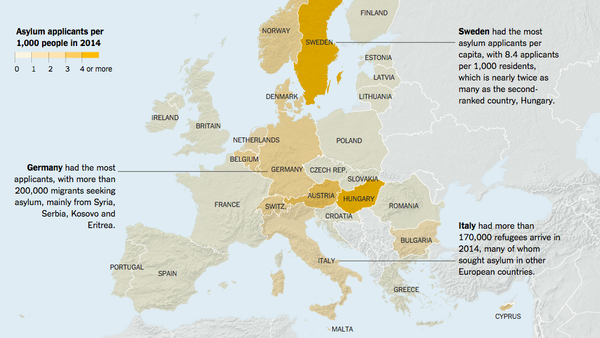
Europe is facing serious crises requiring long-term thinking and necessitating cooperation and solidarity. In trying to ‘control’ the influx of immigrants seeking refuge in Europe, the 28 Member States will have to agree at the EU level on a ‘real’ set of measures such as quotas per countries (all the MS) based on a 10 year plan, an increase in common border control, national and european reforms of the current laws on asylum, and eventually more international operations in order to stabilize the political situations in countries of origins.
These measures can only be agreed on if the national leaders are serious in finding long-term solution and are ready to defend such plan before their electorate. On the one side, European leaders have become visionless administrators enslaved by polling numbers and reelections. On the other, Europeans have to realize that solidarity will be necessary even in these dire economic times. There are not that many options and the influx will continue. The Europeans still have the time to open their doors to these migrants with cohesive European policies and real structures to integrate them in the different societies. Integration of these migrants is possible and necessary. Rejecting them will only widen the gap and push European cohesion to its limits.
